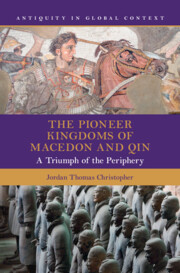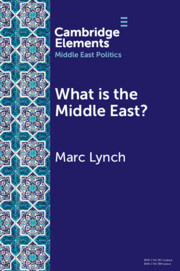Refine search
Actions for selected content:
385 results

Cultural Property
- Law, Policy, and Markets
-
- Published online:
- 05 November 2025
- Print publication:
- 30 October 2025
1 - International Security: The Historical Evolution of a Discipline
-
- Book:
- Understanding International Security
- Published online:
- 11 October 2025
- Print publication:
- 30 October 2025, pp 1-16
-
- Chapter
- Export citation
International lulz: Exploring the strategic logic of trolling in diplomacy
-
- Journal:
- European Journal of International Security , First View
- Published online by Cambridge University Press:
- 24 October 2025, pp. 1-21
-
- Article
-
- You have access
- Open access
- HTML
- Export citation
Introduction
-
- Book:
- The City's Defense
- Published online:
- 09 October 2025
- Print publication:
- 23 October 2025, pp 1-26
-
- Chapter
- Export citation
Latin America and Europe in the Twentieth Century: Looking to The Americas Archives
-
- Journal:
- The Americas , First View
- Published online by Cambridge University Press:
- 17 October 2025, pp. 1-20
-
- Article
-
- You have access
- Open access
- HTML
- Export citation

Understanding International Security
- Theory and Practice
-
- Published online:
- 11 October 2025
- Print publication:
- 30 October 2025
-
- Textbook
- Export citation

Operation Wrath of God
- The Secret History of European Intelligence and Mossad's Assassination Campaign
-
- Published online:
- 12 August 2025
- Print publication:
- 07 August 2025
1 - Political Legitimacy as an Intellectual Journey
- from Part I - Setting the Stage
-
- Book:
- The Law and Politics of International Legitimacy
- Published online:
- 14 July 2025
- Print publication:
- 24 July 2025, pp 11-23
-
- Chapter
- Export citation
(Don’t) Visit Rwanda: Rwanda’s Sportswashing and Its Western Facilitators
-
- Journal:
- African Studies Review / Volume 68 / Issue 2 / June 2025
- Published online by Cambridge University Press:
- 21 July 2025, pp. 315-337
-
- Article
-
- You have access
- Open access
- HTML
- Export citation
Representing Sápmi: Analysing the development of the Saami Council as an Indigenous paradiplomatic organisation
-
- Journal:
- Polar Record / Volume 61 / 2025
- Published online by Cambridge University Press:
- 25 June 2025, e16
-
- Article
-
- You have access
- Open access
- HTML
- Export citation
Chapter 6 - Finance and the Critique of Infrastructural Reason
- from Part I - Conceptual Approaches
-
-
- Book:
- The Cambridge Global Handbook of Financial Infrastructure
- Published online:
- 21 May 2025
- Print publication:
- 05 June 2025, pp 64-74
-
- Chapter
-
- You have access
- Open access
- HTML
- Export citation
2 - Human Goals
-
- Book:
- Democracy for a Sustainable World
- Published online:
- 12 June 2025
- Print publication:
- 05 June 2025, pp 49-82
-
- Chapter
- Export citation

The Pioneer Kingdoms of Macedon and Qin
- A Triumph of the Periphery
-
- Published online:
- 24 May 2025
- Print publication:
- 05 June 2025
3 - The Battle Lines
- from Part II - Negotiating and Designing Economic Governance
-
- Book:
- Balancing Pressures
- Published online:
- 02 May 2025
- Print publication:
- 22 May 2025, pp 45-68
-
- Chapter
- Export citation
The circle of the world: the global diplomacy of Caliph al-Manṣūr
-
- Journal:
- Bulletin of the School of Oriental and African Studies , First View
- Published online by Cambridge University Press:
- 11 April 2025, pp. 1-16
-
- Article
-
- You have access
- Open access
- HTML
- Export citation
The New Chinese Doctrine of Non-Intervention
-
- Journal:
- International & Comparative Law Quarterly / Volume 74 / Issue 2 / April 2025
- Published online by Cambridge University Press:
- 08 August 2025, pp. 377-408
- Print publication:
- April 2025
-
- Article
-
- You have access
- Open access
- HTML
- Export citation
Japan, Australia, and the Rejigging of Asia-Pacific Alliances
-
- Journal:
- Asia-Pacific Journal / Volume 18 / Issue 22 / November 2020
- Published online by Cambridge University Press:
- 14 March 2025, e1
-
- Article
-
- You have access
- Open access
- Export citation
2 - Global Conjunctures and the Remaking of European Political History
-
-
- Book:
- Globalizing Europe
- Published online:
- 06 March 2025
- Print publication:
- 13 March 2025, pp 27-41
-
- Chapter
- Export citation
12 - Why Global Platform Governance Is a Sham
-
-
- Book:
- Defeating Disinformation
- Published online:
- 30 January 2025
- Print publication:
- 06 February 2025, pp 193-201
-
- Chapter
-
- You have access
- Open access
- HTML
- Export citation

What is the Middle East?
- The Theory and Practice of Regions
-
- Published online:
- 03 February 2025
- Print publication:
- 20 February 2025
-
- Element
- Export citation
